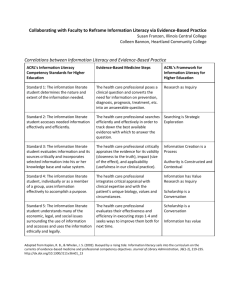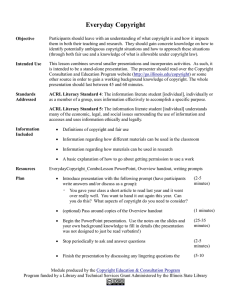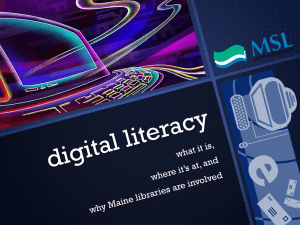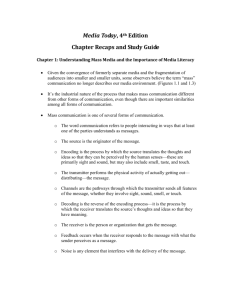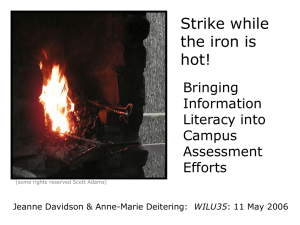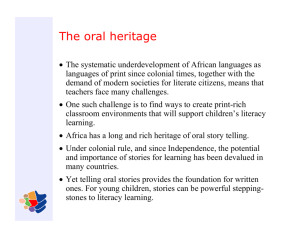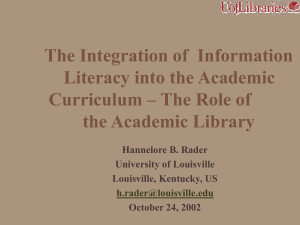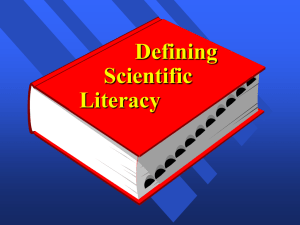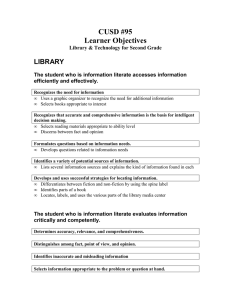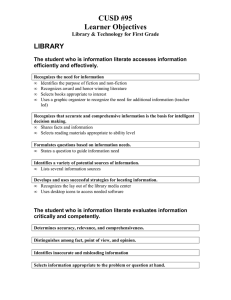Seeking Knowledge: Student Judgment, Epistemology, and First
advertisement
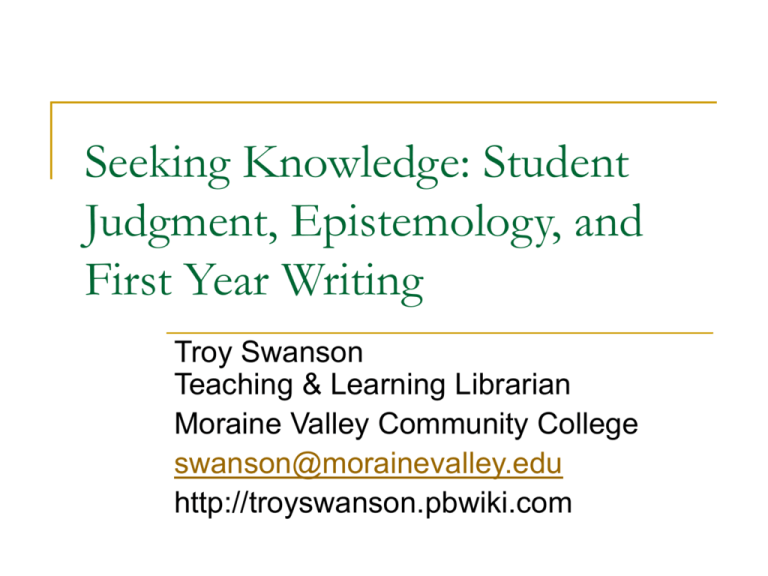
Seeking Knowledge: Student Judgment, Epistemology, and First Year Writing Troy Swanson Teaching & Learning Librarian Moraine Valley Community College swanson@morainevalley.edu http://troyswanson.pbwiki.com Information Literacy and the Knowledge-Based Society Peter Drucker (Post-Capitalist Society 1993) indicates that the knowledge economy needs individuals that can think across disciplines. This would require “a methodology for problem definition—even more urgently perhaps than it requires the currently fashionable methodology for ‘problem solving. It requires systematic analysis of the kind of knowledge and information a given problem requires...”(p.193) “Source-Based Writing Project” (Critical Approach to Information Literacy) Problem (circa 2000): Students were making uninformed choices when selecting sources for papers and tools to use in research. Class: First-Year Composition, COM 101 Novice vs. Experts Novice Knows comparably little about topic Unaware of existing sources, experts, or search tools Has little to no experience interpreting metadata (publication, type of information, etc) Does not make Predictive Judgments Expert Internal Knowledge-base Has expectation for existing knowledge Collects Most Information from colleague or citations When searching, evaluates results with past knowledge using metadata (publication, type of information, etc) Makes Predictive Judgments Difference Between Novice and Expert Expert can more clearly articulate an Information Need Expectation for level of credibility for desired information Recognition of possible points-of-view to consider Definition of various topics that might be relevant to the topic Consideration of timeliness of needed sources Use this understanding to select tools to use to search for desired information Sections of ACRL Info. Literacy Standards Emphasizing the Understanding of Information Standard One: The information literate student determines the nature and extent of the information needed. Performance Indicator 2: The information literate student identifies a variety of types and formats of potential sources for information. Outcome C: Identifies the value and differences of potential resources in a variety of formats (e.g., multimedia, database, website, data set, audio/visual, book) Outcome D: Identifies the purpose and audience of potential resources (e.g., popular vs. scholarly, current vs. historical) Sections of ACRL Info. Literacy Standards Emphasizing the Understanding of Information Standard Two: The information literate student accesses needed information effectively and efficiently. Performance Indicator 4: The information literate student refines the search strategy if necessary. Outcome A: Assesses the quantity, quality, and relevance of the search results to determine whether alternative information retrieval systems or investigative methods should be utilized Outcome B: Identifies gaps in the information retrieved and determines if the search strategy should be revised Sections of ACRL Info. Literacy Standards Emphasizing the Understanding of Information Standard Three: The information literate student evaluates information and its sources critically and incorporates selected information into his or her knowledge base and value system. Performance Indicator 2: The information literate student articulates and applies initial criteria for evaluating both the information and its sources. Outcome A: Examines and compares information from various sources in order to evaluate reliability, validity, accuracy, authority, timeliness, and point of view or bias Outcome B: Analyzes the structure and logic of supporting arguments or methods Outcome C: Recognizes prejudice, deception, or manipulation Outcome D: Recognizes the cultural, physical, or other context within which the information was created and understands the impact of context on interpreting the information Our COM 101 Objectives Students will: Be able to identify the information type of a given source. Be able to select search tools and sources for information based on their information need. Be able to locate, evaluate and select sources that satisfy their information need. Assignment: 2 Papers 1. 2. Paper about 2 sources Paper about a problem in a community 3 Class Sessions Session 1: Types of Information Session 2: Defining an Information Need How are information sources different? How do we define credibility? What is my task? What do I know about a topic? What predictions can I make about what I need? How do I link my results with Information need? Session 3: Searching for Information What tools have the needed information? How can I use them to access this information? Linking Needs to Outcomes Relevance topics, search terms Credibility type of information, who should I listen to? Point-of-View recognition of bias, seeking balance Timeliness answering the when question Durability here today, still here tomorrow? Understanding the Process 1. 2. 3. 4. Idea (thesis statement) Info need defines Test (find outside sources) Learn (consider new knowledge to modify your thesis) Use How will you use what you find and learn? Answers the “Standard #4 Question” Personal Epistemology Nature of Beliefs Self Reinforcing Established Early in Life Classroom Setting Not Conducive to Change Lisa Bendixen (UNLV) Simple Knowledge Certain Knowledge Omniscient Authority Quick Learning Fixed Ability Assessment Sources of Student Papers Surveys Bendixen Survey Information Use Survey (MVCC) Project SAILS (Kent State) Focus Groups Key Leanings Students understand they need to recognize good vs bad information Students are more savvy than anticipated Should vs. Actual is different Students base views of research process on style of paper they are writing “Used to Just Throw Things Together” The “library Web thing” Growth in conceptualization about expectations and research process Selected Readings Bates, M., (1989). The design of browsing and berrypicking techniques for the online research interface. Online Review 13, (5): 409–10. Bell, D. (1973). The coming of post-industrial society: a venture in social forecasting. New York: basic books. Bendixen, L. and Rule, D. (2004). An integrative approach to personal epistemology: Educational Psychologist. 39, 1, 69-80. Drucker P. (1993). Post-Capitalist society. Harpercollins. Kuhlthau, C. (1993). Seeking meaning: a process approach to library and information science. Norwood, NJ: Ablex Publishing. Rieh, S. (2002). Judgment of information quality and cognitive authority in the Web. Journal of the American Society for Information Science and Technology. 53(2): 145-161. Schommer-Aikins, M. (2004). Explaining the epistemological belief system: introducing the embedded systemic model and coordinated research approach. Educational Psychologist. 39, 1 19-29. Wilson, P. (1983). Second-hand knowledge. Westport, CN: Greenwood Press.


